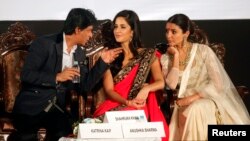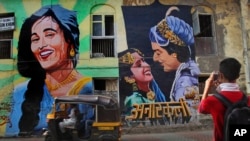NEW DELHI —
India’s hugely popular Hindi film industry known as Bollywood celebrates its 100th birthday Friday. With a loyal following not only in India, but several Asian countries, Bollywood is evolving from making extravagant, romantic films to more experimental cinema. But its primary mission remains entertainment for movie-mad Indians.
It is a special day for 33-year-old Ekta Kapoor as she gets ready to watch Bollywood’s newest release - Bombay Talkies - a collection of four short films commemorating 100 years of Bollywood. Kapoor is like millions of Indians - passionate about Hindi movies.
"Excitement. I love anything to do with Bollywood right from childhood. Can’t think of life without Bollywood," said Kapoor.
Since the day that a black and white story of a king from Hindu mythology, Raja Harishchandra, hit the silver screen in India in 1913, Bollywood has traveled a long way.
Known for films peppered with catchy song and dance numbers, Bollywood is the dominant film industry in India - a country that produces more than 1,000 movies and sells three billion movie tickets each year.
Experimenting
For decades Bollywood was defined by its staple fare: family entertainers and romantic sagas played out by glamorous film stars - almost always with happy endings and a heady dose of fantasy.
"It is the family values, the song and dance, the stars, the kind of un-ironical optimism, it is all very cheerful and it is very sort of sweetly optimistic and that is something that travels very well," explains Anupama Chopra, an author and film critic in Mumbai. "It is almost a catharsis where you are just letting it go because of the melodrama, the emotions and everything is heightened to the power of 10."
But Chopra said that is changing slowly. The escapist fantasies are giving way to fresher stories as Bollywood begins to tread new ground. And a new crop of experimental filmmakers is making an impact. The new artists are directors like Dibakar Banerjee, who tells one of the stories in Bombay Talkies.
Banerjee said there is potential and space for new ideas in the industry, but it is not going to be easy to build on this trend. He says today most stories are being driven by urban India.
"The new rich or affluent urban middle class has become the biggest contributor to a film’s success and the subject and the stories and the conflicts in the films over the last 10-15 years have become more and more urban. There has been an increase in some kind of challenge to the old moral order, the old social order," she said.
Bollywood films are hits not just in India, but across Asian countries from the Middle East to Central Asian countries like Afghanistan, and East Asian nations like Indonesia and Malaysia.
They are even finding a small audience in some European countries. Top Indian film stars have long been household names in these countries, giving Bollywood the title of India’s cultural ambassador in Asia.
Appealing to other Asian audiences
Banerjee explains what gives Bollywood a strong connection with Asian audiences.
"The concerns of the average Indian people were the concerns of these people, which was one of preservation of family, the preservation of tradition, a certain way of life, under the fiercesome assault of Western values," said Banerjee.
"These films told us, we are all right, we are all there. But over the last 20 years even that is changing. We are in flux now, and the only way we can maintain the cultural leadership is to redefine our content to make it a little more truer to the reality of India today.”
As Bollywood steps into its second century, it is exuding optimism after shrugging off competition from the proliferation of entertainment channels on television. The government gave filmmaking formal industry status just over a decade ago, making it easier to raise financing. It also opened the door for foreign film studios such as Warner Brothers to invest in India.
Films as a "religion"
But primarily it is India’s love for cinema that ensures the industry’s future, says film critic Chopra.
"My longstanding belief is that films are a religion in this country. This is the second golden age of Bollywood… we are in a space where you have growing markets, you have a plethora of new talent, you have audiences willing to accept things that are unusual. For me it is all uphill from here," said Chopra.
That is certainly what fans like Ekta Kapoor hope - they want Bollywood to explore newer dimensions, but never lose the vibrancy and glamour that gives it its unique identity.
It is a special day for 33-year-old Ekta Kapoor as she gets ready to watch Bollywood’s newest release - Bombay Talkies - a collection of four short films commemorating 100 years of Bollywood. Kapoor is like millions of Indians - passionate about Hindi movies.
"Excitement. I love anything to do with Bollywood right from childhood. Can’t think of life without Bollywood," said Kapoor.
Since the day that a black and white story of a king from Hindu mythology, Raja Harishchandra, hit the silver screen in India in 1913, Bollywood has traveled a long way.
Known for films peppered with catchy song and dance numbers, Bollywood is the dominant film industry in India - a country that produces more than 1,000 movies and sells three billion movie tickets each year.
Experimenting
For decades Bollywood was defined by its staple fare: family entertainers and romantic sagas played out by glamorous film stars - almost always with happy endings and a heady dose of fantasy.
"It is the family values, the song and dance, the stars, the kind of un-ironical optimism, it is all very cheerful and it is very sort of sweetly optimistic and that is something that travels very well," explains Anupama Chopra, an author and film critic in Mumbai. "It is almost a catharsis where you are just letting it go because of the melodrama, the emotions and everything is heightened to the power of 10."
But Chopra said that is changing slowly. The escapist fantasies are giving way to fresher stories as Bollywood begins to tread new ground. And a new crop of experimental filmmakers is making an impact. The new artists are directors like Dibakar Banerjee, who tells one of the stories in Bombay Talkies.
Banerjee said there is potential and space for new ideas in the industry, but it is not going to be easy to build on this trend. He says today most stories are being driven by urban India.
"The new rich or affluent urban middle class has become the biggest contributor to a film’s success and the subject and the stories and the conflicts in the films over the last 10-15 years have become more and more urban. There has been an increase in some kind of challenge to the old moral order, the old social order," she said.
Bollywood films are hits not just in India, but across Asian countries from the Middle East to Central Asian countries like Afghanistan, and East Asian nations like Indonesia and Malaysia.
They are even finding a small audience in some European countries. Top Indian film stars have long been household names in these countries, giving Bollywood the title of India’s cultural ambassador in Asia.
Appealing to other Asian audiences
Banerjee explains what gives Bollywood a strong connection with Asian audiences.
"The concerns of the average Indian people were the concerns of these people, which was one of preservation of family, the preservation of tradition, a certain way of life, under the fiercesome assault of Western values," said Banerjee.
"These films told us, we are all right, we are all there. But over the last 20 years even that is changing. We are in flux now, and the only way we can maintain the cultural leadership is to redefine our content to make it a little more truer to the reality of India today.”
As Bollywood steps into its second century, it is exuding optimism after shrugging off competition from the proliferation of entertainment channels on television. The government gave filmmaking formal industry status just over a decade ago, making it easier to raise financing. It also opened the door for foreign film studios such as Warner Brothers to invest in India.
Films as a "religion"
But primarily it is India’s love for cinema that ensures the industry’s future, says film critic Chopra.
"My longstanding belief is that films are a religion in this country. This is the second golden age of Bollywood… we are in a space where you have growing markets, you have a plethora of new talent, you have audiences willing to accept things that are unusual. For me it is all uphill from here," said Chopra.
That is certainly what fans like Ekta Kapoor hope - they want Bollywood to explore newer dimensions, but never lose the vibrancy and glamour that gives it its unique identity.









